Battling the TB/HIV Epidemic through Community Action
Through advocacy workshops and by coordinating and supporting activists’ advocacy efforts, TAG and ICW work together to increase community understanding of TB/HIV coinfection and enhance research, treatment, and resources to combat the two epidemics.
Thanks to all of my activist colleagues around the world who impress and amaze me with your work every day.
— Nelson Juma Otwoma
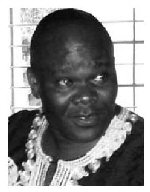 Nelson Juma Otwoma, Kenya
Nelson Juma Otwoma, Kenya
Multiface Development and Research Centre
I have always wanted to make a difference. My activism took root in my home province, Nyanza, Kenya. My activism has always been focused on alleviating the burden of poverty and promoting health. I have always had an intense inner feeling that something needed to change; in fact, I was probably born an activist!
In 2001, I helped to found the Multiface Development and Research Centre (MDRC) with the mission of building local capacity to identify problems and seek suitable solutions in the areas of health and development. In the early days of activism at MDRC, my role was to say the things that no one else was saying … poor people were suffering with disease, poverty, and ignorance. MDRC was well aware of the burden caused by HIV and TB and when the opportunity presented itself, MDRC sought funding to address the burden of TB in the Suba district of Western Kenya. The intention of MDRC was to get people talking about TB and poverty in the hope that TB service delivery would improve in Suba. As the lead researcher of MDRC’s TB/HIV Advocacy project, I was able to prioritize TB/HIV as an area of interest for the organization, and this continues to be a cornerstone of my own advocacy agenda.
Through my work with TAG, ICW and other organizations supporting TB/HIV work, I have had the opportunity to learn more about advocacy. I have gained knowledge about research, the skills and steps of advocacy, and the lessons learned from the work done by other activists. This has helped me redefine my own TB/HIV advocacy agenda.
Understanding the science and policy aspects of TB/HIV has been vital in my advocacy to make civil society a stronger partner in allocating resources, as well as making sure that government programs meet our needs. Marrying the understanding of policy, science, and research with my understanding of my community has made the advocacy of MDRC more focused and powerful.
Contact Nelson at otwomatom@yahoo.com.
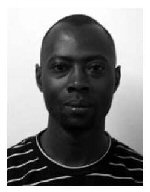
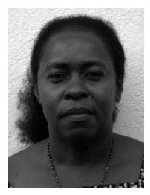 Aaron Muhinda and Prima Kazoora, Uganda
Aaron Muhinda and Prima Kazoora, Uganda
HEPS-Uganda
HEPS is a health consumers’ organization advocating for health rights and responsibilities. Through their involvement with the Advocacy Project, Aaron and Prima have had great success in integrating TB advocacy into HEPS’s HIV work. Using resources and knowledge gained from TAG-ICW trainings combined with strong organizational support from HEPS (under the umbrella of the Uganda Coalition for Access to Essential Medicines), they have developed and implemented a TB and HIV medicine and diagnostics monitoring tool. They are using the data on availability and accessibility of TB and HIV medications and diagnostics to lobby policy makers to improve treatment access. This monitoring effort was originally focused on HIV, but participation in the Advocacy Project enabled Aaron and Prima to advocate for the inclusion of TB. HEPS has been able to build strong support for their work by involving diverse stakeholders such as the Ministry of Health, the WHO, and the Uganda AIDS Commission as well as fellow TB/HIV activists and community members.
For more information, please visit www.heps.org or e-mail Aaron at muhindaaaron@yahoo.com or Prima at pmkazoora@yahoo.com.
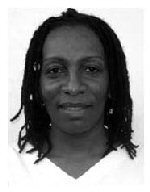 Carol Nawina Nyirenda, Zambia
Carol Nawina Nyirenda, Zambia
Treatment Advocacy and Literacy Campaign (TALC)
Carol has lived with HIV for many years and has also survived TB treatment. She has been able to transform this personal experience into a political campaign to address TB/HIV, and has incorporated TB advocacy into her national and global HIV activism.
Participating in the TAG-ICW advocacy trainings gave Carol a knowledge base of TB science, diagnostics, and treatment that has enabled her to train other activists on TB and TB/HIV coinfection and, along with fellow Zambian activists, to advocate for the Zambian government to implement WHO recommendations for collaborative TB/HIV activities. Carol has received global recognition for her activism and served as a panelist at the April 2008 meeting in Thailand of the UNAIDS Program Coordinating Board (PCB), addressing the issue of multidrug-resistant TB among people living with HIV. In part, her advocacy led the UNAIDS PCB to decide to monitor TB/HIV mortality numbers as a measure of the impact of the implementation of the collaborative activities recommended by the WHO policy to reduce the burden of TB/HIV. Carol was also invited to be part of the International Treatment Preparedness Coalition’s World CAB meeting to discuss treatment access issues with the pharmaceutical industry. She is a community representative on the Stop TB Partnership’s New Diagnostics Working Group, and is a board member representing communities of people living with TB, HIV, and malaria for UNITAID, where she has successfully lobbied for the provision of resources for diagnostics for TB drug resistance testing. For more information, please visit www.talczambia.org or e-mail Carol at carolnawina@yahoo.com.
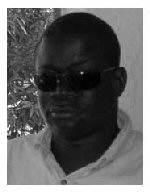 Coulibaly Gaoussou, Cote d’Ivoire
Coulibaly Gaoussou, Cote d’Ivoire
Bouake Eveil
Coulibaly has been very active in advocating for the implementation of TB/HIV collaborative activities in his country. Through his work with Bouake Eveil, Coulibaly has provided support and education to people living with HIV and those who are coinfected, with a particular focus on the importance of TB preventive therapy among people living with HIV. His organization has successfully advocated for a more collaborative approach to fighting TB and HIV in the Bouake district and Coulibaly has also participated in some national HIV policy discussions and pushed for the inclusion of TB/HIV. Coulibaly has developed a comprehensive TB/HIV program in his organization that includes infection control measures and community TB/HIV sensitization. He has also created an association of people living with HIV and TB and their families. Because Bouake is affected by rebel activity, public health services are unstable, so Coulibaly also makes home visits to persons with HIV and TB to ensure that people have access to needed services. For more information, please e-mail Coulibaly at c_gaoussou@yahoo.fr.
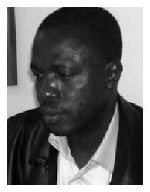
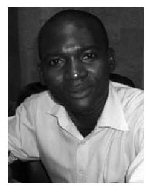 Joel Mayowa, Nigeria
Joel Mayowa, Nigeria
Treatment Access Movement;
Obatunde Oladapo, Nigeria
Positive Life Association of Nigeria, Stop TB Partnership-Nigeria
In November 2007, Joel and Oba traveled to the Union World Conference on Lung Health in Cape Town, South Africa, as part of their participation in the Advocacy Project. At the conference they met with other Nigerian stakeholders who were dismayed by their country’s dismal level of participation in the conference as well as the lack of a coordinated response to address the TB burden in Nigeria. As community representatives to the Stop TB Partnership Working Groups on TB/HIV (Oba) and Advocacy, Communication, and Social Mobilization (Joel), they advocated for the creation of the Stop TB Partnership-Nigeria. This goal was achieved in May 2008 when over 90 national stakeholders gathered for the group’s inaugural meeting. Joel and Oba are helping to plan the first Nigerian National TB Conference to increase awareness of persons with HIV about the importance of TB/HIV. They have also done capacity building on TB/HIV treatment literacy and advocacy for different stakeholders in the country, including government, NGOs, and people infected and affected by either or both TB and HIV. Both Joel and Oba have stated that the TAG-ICW Advocacy Project, which provided them with treatment and policy literacy and advocacy workshops, has helped them be more effective TB/HIV activists. For more information, please email Joel at mayowajoel@yahoo.com or Oba at obatunde65@gmail.com.
 Wim Vandevelde, Portugal
Wim Vandevelde, Portugal
European AIDS Treatment Group
Before participating in the Advocacy Project, Wim’s main focus was HIV/HCV treatment advocacy for countries in the WHO European region. TAG-ICW training and support provided Wim with the tools to understand why TB is of concern for persons with HIV and strengthened his capacity to incorporate TB into his advocacy work. Wim was invited to be part of the Advocacy Project because of his role as a community representative to the Stop TB Partnership’s New Drugs Working Group. He has also helped to set up a civil society network of Lusophone countries where he successfully advocated for the inclusion of TB/HIV into the network’s priorities as well as into the Community of Portuguese Language Countries’ health agenda. Wim gave a keynote address on community input in the regulatory process at the Global Alliance for TB Drug Development’s Open Forum meeting in New Delhi in May 2008, ensured the inclusion of community perspectives in a scientific paper on priorities for new TB drug development, and provided the community perspective to the Portugal Ministry of Health on World TB Day. As chairperson of the EATG, Wim often meets with the private sector to monitor and advocate for a drug research agenda that responds to community priorities, and since his involvement with TAG and ICW Wim has incorporated TB drug development concerns in his meetings with pharmaceutical companies. For more information, please visit www.eatg.org or email Wim at wim@eatg.org.
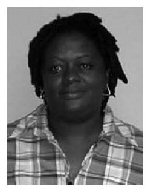 Thembi Nkambule, Swaziland
Thembi Nkambule, Swaziland
Swaziland National Network of People Living with HIV/AIDS
As an HIV treatment activist in a country with high TB/HIV prevalence, Thembi welcomed the opportunity to learn more about TB and to incorporate this knowledge into her activism. After attending advocacy workshops Thembi, through SWANNEPHA, has provided training on TB/HIV to 38 support groups and a core group of activists, and has improved SWANNEPHA’s capacity to do TB/HIV advocacy and outreach. She has also helped develop a community training manual on TB/HIV and has already seen more comfort on the part of people with HIV to discuss TB within their network. Thembi has also been working on national policy advocacy to get people with HIV meaningfully integrated into TB and HIV programming and service delivery. Her national work was shared with global activists and TB/HIV implementers when she presented findings from her own and other activists’ work at the 2008 PEPFAR HIV/AIDS Implementers Meeting in Uganda in June 2008. For more information, e-mail Thembi at tnkambule@swannepha.org.sz.
